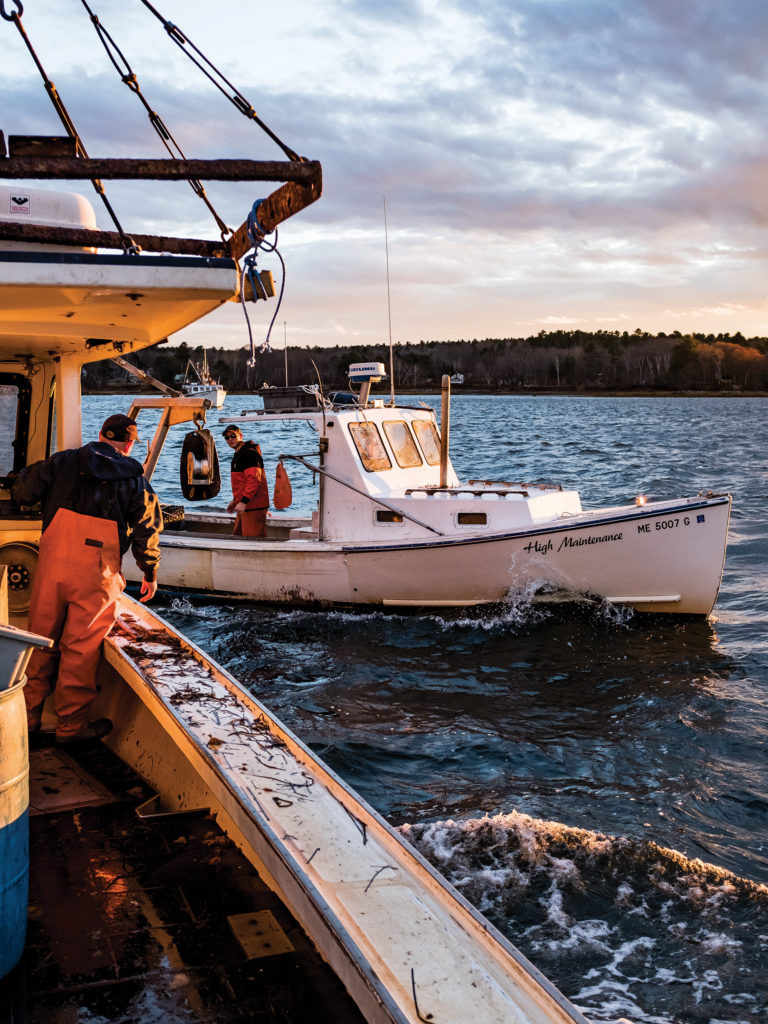From Our Readers: Love Letters to Fish and the People Who Catch Them
For our May issue, we asked readers to write a letter to Maine’s fishing industry.

I have written much about Maine over the years. Much of it dark, and much of it about friends, neighbors, lovers, captains, deer, trucks, and, of course, the ocean. About the never-ending cold in March and April and May. But also about the first warm morning before the westerlies pick up in April, working on traps between the two piles on the wharf and wearing a cutoff T-shirt for the first time since October. About the salt coating our faces at the end of a day fishing offshore or about the dirt stuck in the creases of our fingers after planting Matinicus dahlias each spring, or about swollen, numb hands after a day of hauling hooks in May. About tireless heartbreak, about deer in the road, deer in the woods watching me from nearby blowdowns, watching from the edge of the woods while I practice with my bow. Thwack! Drawing them in like shadows. About big diesels flying around island roads or dry wind in springtime sweeping across a field or snow in May woods and a thin layer of ice over mudflats. Much of what I have written is in small notes in my journal or in letters or in poems. Writing cannot escape that wherein it takes place. We cannot write without writing of Maine.
—Lillian Saul, Vinalhaven
I met the late, great Ronnie(“R.K.”) Ames of Matinicus in August 1990. I was attending USC film school in Los Angeles at the time and wanted to research lobstering for a script.
I was born and raised in Maine, but inland. I considered lobstermen, and fishermen in general, larger than life—marine cowboys. I thought a visit to Ronnie and his family on Matinicus with my Aunt Mary (a longtime friend of his) would dispel such romanticism. I could not have been more wrong. For dinner we ate lobster and a buttery chardonnay his son uncorked with a drill. One wall was lined with books. Lace curtains danced in the late breeze. You could smell bayberry, rugosa, salt. Long into the night we talked. We were on his boat by 4 a.m. like clockwork. Gun on the bow, political exchanges on the radio. It was brute work in a breathtaking setting—a ritual. I managed not to get hauled overboard by the lines.
In my mind Ronnie stands seven feet tall, although I know this is impossible. In a picture (on a Christmas card my aunt still has), Ronnie wears a head-to-toe lynx coat in the snow, looking like he just stepped out of a Russian novel. There he looks eight feet tall. Whenever I eat lobster, I think of two things: I haven’t paid enough for all the work it took, and I raise a glass to Ronnie Ames.
—Sherry Abaldo, Union
I have loved the Maine lobster industry since I was a lad. My family spent a week or two on Long Island in Casco Bay every summer. I woke up early every morning, snuck Corn Pops from my siblings, and sat on the lawn with binoculars, watching the lobstermen haul traps. It was my favorite thing to do. On foggy days I’d bike down to Clark’s store and listen to the fishermen hanging around drinking coffee and “gamming.” One of them exclaiming that it was so foggy that one morning he hauled one of his own traps by mistake!
Zoe Rich was an old-timer on the island back who fished out of Harbor de Grace, and the epitome of a wise, weathered old lobsterman who knew the bottom of the ocean better than he knew the roads of the island. The lobster fishery represented (and still does) the backbone of so many island communities— communities that are close-knit, self-reliant, and insular, just as a family or clan would be. The industry and the fishermen are to the coast of Maine as Moai are to Easter Island. If they were gone, changed, or diminished in any way, the place would lose much of its character. Having spent a good deal of time on the water in Maine I have come to appreciate the 4 a.m. wakeup of the boat firing up. Where once it was the thing that disturbed my slumber, I have come to appreciate it for what it is: the sound of freedom and independence, heritage and hardship, industry and perseverance. Maine lobstermen, please don’t change.
—Graham McKay, Newburyport, MA
Dear Cyclopterus lumpus (or as I like to call you, my little lumpfish)
I am not sure exactly what I love most about you, so let me count the ways. Your face has more personality packed into a small space than any other fish I know. You can go from wry to goofy with just a slight twist of your shapely head. Then there is your color, which varies like the choices of comfy L.L.Bean chamois shirts: bluish gray, yellow green, chocolate, kelp brown, or slate blue. And then there are your cleverly modified fins that act like a suction cup, holding you tight against cruel waves and currents. Every summer, I search for you hanging on to sugar kelp growing under the dock. Once the cruel snow and ice of winter leave, we can find each other once again on sunny days on the Damariscotta River.
—Edward Seidel, Damariscotta

